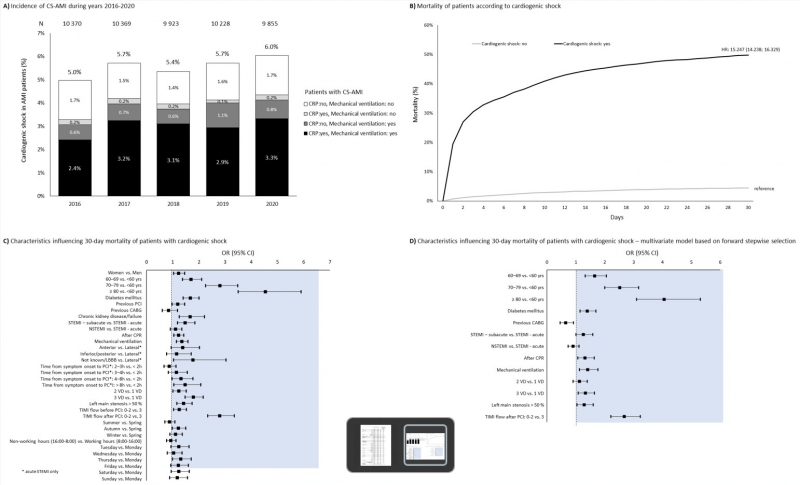PREDICTORS OF PROGNOSIS IN CARDIOGENIC SHOCK COMPLICATING INITIALLY ACUTE MYOCARDIAL INFARCTION
Despite modern treatment methods, cardiogenic shock mortality complicating acute myocardial infarction (CS-AMI) remains high.
The study of factors affecting CS-AMI outcomes is essential.
Data from the National Registry of AMI from 2016 to 2020 were evaluated. Of 50,745 patients with AMI 2,822 patients (5.6%) had initially CS(72.6% men, mean age 67.6 (12) yrs). The study analyzed the predictive value of such traditional cardiovascular risk factors related to the MI(sex, age, previous PCI or CABG, renal failure, MI localization, reperfusion delay time), comorbidities, the state on admission (mechanical ventilation, resuscitation), the extent of CAD and procedural success (the number of affected vessels, TIMI flow before and after PCI), and such untraditional factors as season, weekday and day time. Multivariable analysis was used to identify independent predictors of prognosis in patients with CS-AMI.
The 30days mortality was 50.7%. As independent predictors of prognosis were identified age (older 80yrs, OR4.97;95% CI 3.73-6.61), resuscitation (1.34; 1.07-1.67), mechanical ventilation (1.39;1.10-1.75), 3-vessel disease (1.39;1.12-1.72), left main disease (1.26; 1.01-1.57), and post-procedural TIMI flow<3 (1.14; 0.79-1.66). The higher mortality was shown during a) autumn (54.2%) and winter(51.8%), b) weekend (51.45%) (vs. working week (50.03%)), c) working hours (49.3%) (vs. the after-working hours (47.6%)), but their predictive value wasn't confirmed in multivariate analysis.
Conclusions: Mortality of CS-AMI patients is significantly and independently influenced by factors confounding their circulatory instability, such as resuscitation and respiratory failure, the extent ofcoronary disease, and the success of reperfusion therapy. The independent impact of comorbidity and non-traditional factors on theprognosis of these patients has not been confirmed.


